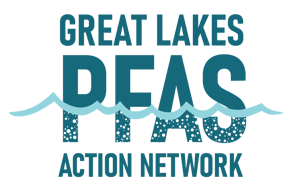
Community members impacted by PFAS, state lawmakers outline policy priorities that will protect our water and health
LANSING — The Great Lakes PFAS Action Network, a coalition of community members impacted by PFAS contamination, met with lawmakers in Lansing today to discuss the widespread impact of toxic PFAS chemicals on the health of Michigan communities and to call for comprehensive legislative action to address the PFAS crisis. Michiganders from communities across the state traveled to Lansing to share their experiences with lawmakers and to unveil the Great Lakes PFAS Action Network Policy Agenda.
“Toxic PFAS chemicals are seriously impacting the health and well-being of people all across Michigan. It’s a growing public health crisis, and our Legislature must act swiftly and comprehensively to address it,” said Tony Spaniola, co-chair of the Great Lakes PFAS Action Network. “As impacted residents and frontline community leaders, we came to Lansing today to meet with lawmakers and stress the need for urgent action to protect our families, our water, and our wildlife.”
PFAS chemicals have been detected in the drinking water of nearly 2 million Michiganders, in freshwater fish in nearly every state, and in every one of the Great Lakes. Exposure to PFAS chemicals has been linked to a number of health complications, including cancer, thyroid problems, autoimmune disorders, and reproductive issues.
“In Michigan, our water is part of who we are, which is why we must ensure all Michiganders have drinking water that is safe and our rivers, streams, and lakes are free from toxic chemicals,” said state Rep. Laurie Pohutsky (D-Livonia), Speaker Pro Tempore, Michigan House of Representatives. “As elected officials, we have a duty to work to protect the health of Michiganders, and that means making addressing PFAS contamination a priority.”
Michigan, through the Michigan PFAS Action Response Team, has conducted testing for PFAS, leading to more than 11,000 potential PFAS sites identified across the state. Testing for PFAS is a critical part of addressing the contamination and identifying areas in need of cleanup. Another important solution is stopping PFAS at the source, which includes banning PFAS-containing products when there are safer alternatives available.
“We are calling for policy solutions to prevent future PFAS contamination, and that starts with stopping PFAS at the source,” said Sandy Wynn-Stelt, co-chair of the Great Lakes PFAS Action Network from Belmont, Michigan. “Legislatures in states across the country and Midwest have already passed laws to protect their residents’ health and address this issue. We look forward to working with lawmakers in Michigan to ensure we are passing similar policies to lead on the fight against PFAS.”
The state legislature is currently working on the state’s budget for fiscal year 2024. A number of funding priorities for the budget could go toward addressing PFAS contamination, including funding for water infrastructure projects to upgrade water treatment plants, stormwater systems and drinking water systems.
“The state budget is a moral document, and it’s our responsibility to ensure we are prioritizing funding for issues that will have direct impacts on peoples’ lives, like ensuring we have safe water to drink that is free from PFAS and other toxic chemicals,” said state Rep. Rachel Hood (D-Grand Rapids). “It’s clear to me that toxic PFAS contamination is a crisis that my colleagues in Lansing and I must continue to address to protect our constituents and ensure healthy Michigan communities.”
Another major issue community leaders seek to address is lack of accountability for polluters when they are found to be responsible for PFAS contamination. In many cases, when a polluter is found to have caused contamination and harm to people and communities, stronger enforcement mechanisms are needed to ensure they pay for cleanup.
“PFAS contamination is not just a suburban issue or a rural issue — communities across the state from Pontiac to Detroit are also grappling with these toxic contaminants,” said state Rep. Brenda Carter (D-Pontiac). “We have an opportunity to address this contamination head-on and make Michigan a leader in this fight while protecting our most vulnerable communities.”
"The same polluters that are spewing dangerous emissions into our air are those that are putting PFAS in our water and our communities," said Theresa Landrum, GLPAN impacted community member from Detroit. “We must do a better job of holding PFAS polluters accountable. This starts with those responsible for contamination to restore the environment they've polluted and avoid carrying the burden onto the residents.”
A full version of the action agenda can be found at https://www.glpan.org/policy-agenda.
###
The Great Lakes PFAS Action Network is a coalition centered and driven by people impacted by toxic PFAS pollution, and supported by the Michigan League of Conservation Voters Education Fund, Ecology Center, National Wildlife Federation and Need Our Water (NOW), Oscoda.













